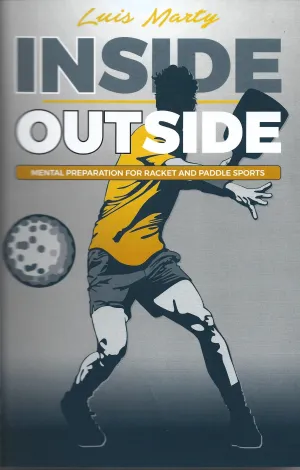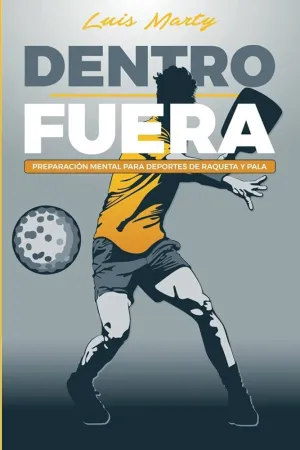
- Editorial:
- AUTOR EDITOR
- Año de edición:
- 2025
- Materia:
- PSICOLOGÍA DEPORTIVA
- ISBN:
- 979-8-3264-2789-2
- Páginas:
- 278
INSIDE OUTSIDE
MENTAL PREPARATION FOR RACKET AND PADDLE SPORTS
LUIS MARTY
INside, OUTside" is a mental training guide for racket and paddle sports athletes, as well as for coaches who want to help their players reach their maximum level of performance and enjoyment. It contains guidelines, tools, and exercises that will allow you to increase your motivation, acquire confidence, effectively manage fear and other emotions, enhance your concentration, as well as have greater commitment and focus on your sports goals. This guide is applicable both on and off the court.
Mental training is a very broad discipline that addresses many aspects in various different ways. I will now provide my own summary definition of what it means to me.
Over several years, I have been applying and validating this system with players, parents, and coaches, with variable results depending on various factors, and reaching certain conclusions. This does not mean that there are no alternative methods and resources to the one I am presenting here, which are also perfectly valid, effective, and even complementary to this one, and therefore contribute to the comprehensive development of the athlete.
The approach I propose here is flexible and dynamic, in the sense that it is not a rigid structure based on firm and immovable principles. Rather, it is a flexible methodology, susceptible to improvement every day, as well as adaptable to any context and situation. Do you remember Bruce Lee's famous quote, "Be water, my friend"? Well, this is exactly what I mean, to flow like water in order to adapt to whatever comes.
Therefore, the philosophy underlying this system is aimed at maintaining an agile, open mind prepared to face sporting and personal challenges with the greatest guarantee of success which does not necessarily have to mean winning as well as enjoying your training sessions and competitions more, remaining true to your essence and your style.
The main purpose of this book is to provide my vision of the methodology that I have been creating and shaping through my years of training and experience as a mental and sports coach. There are many ways to approach this part of sports preparation, with it being fundamental, in my view, for it to focus on the individual, their value system, and their emotional baggage, which can and should always run parallel to the improvement of their sports performance.
The central element of this book is to present the mental training system that I have developed and apply with the players and coaches I work with. However, I will omit, as much as possible, expressions like "in my opinion" or "from my point of view," to make the reading more fluid and enjoyable for the reader.
Mental training is a preparation system for racket athletes, based on guidelines and tools directly applicable to their daily lives. This system aims to provide you with simple procedures and resources to work on and improve factors such as concentration and attention; the management of emotions, such as frustration, anger, or euphoria; self-control; internal dialogue; and the development of values such as discipline and commitment, among other aspects, so that the player remains mentally organized and balanced when training and/or competing.
The fact that, as I indicated in the previous paragraph, these procedures are easy to understand and apply does not mean that it is easy to train and improve aspects such as emotional management or concentration. The essential condition for you to apply this method and obtain positive results regarding your performance or that of your players, if you are a coach is that, before starting with it, you acquire the necessary will and commitment with yourself to carry it out consistently and systematically.
In other words, if you want to develop the ability to maintain a high level of concentration, have higher-quality thoughts, and manage your emotions constructively on the court, I invite you to put these guidelines and tools into practice every day. You must be patient, as the results are not immediate.
It is said that to acquire a habit, whether in sports or in any other area, it is necessary to maintain that habit for at least 21 days. Therefore, before starting, you must prepare yourself for the level of commitment, discipline, and planning that you must acquire to achieve the goal.
Imagine that you wanted to increase your physical endurance and only spent a short time running or cycling every 4 or 5 days. Do you think you would notice significant changes in your physical endurance if you did this? Probably not. However, if you work every day to improve your physical abilities (endurance, strength, speed, etc.), preferably with the help of a physical trainer, you will notice how your performance gradually increases. You may even come to enjoy the process, however tough it may be, as you will notice improvements in your physical condition and appearance. If you become obsessed with achieving it as soon as possible or go from being a sedentary person to training for several hours a day every day of the week, you will probably get tired and stop training.
The same goes for mental preparation. I often hear people say that they don't need it because they "don't have any problems with their mind." Going back to the previous example, should only those who have "problems" with their bodies devote time and effort to improve their physical abilities? Obviously not.
Regarding this, there is a popular belief that only athletes who have some "problem," such as lack of self-control or inability to concentrate when training or competing, should work with a mental coach. In my opinion, nothing could be further from the truth, as the goal of training the mind should be to gradually improve these skills over time to increase performance and enjoy more on the court, which, in turn, will make you more competent at other levels, such as intellectual, academic, or professional.
As I indicated at the beginning of this section, sports training is broad, as it encompasses many areas. The purpose of this book is to provide you with tools that you can apply in your on-court and off-court training in order to be more aware of your thoughts and emotions and, therefore, get to know yourself better.
Likewise, you will have the opportunity to enhance your concentration, attention, self-motivation, emotional management, self-control, and discipline skills. If you are a coach, you can apply these guidelines with your players in your training sessions to help them improve these factors.
Shall we begin?







